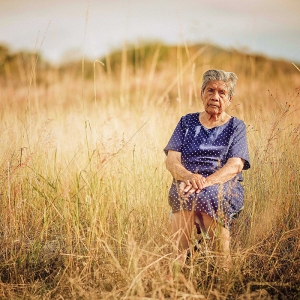A Q&A with Associate Professor María Aranda on Depression Among Aging Latino Populations
July 19, 2017For National Minority Mental Health Month, a USC professor shares her insights on depression among older Latino adults.
María Aranda, an associate professor holding joint appointments with the USC Suzanne Dworak-Peck School of Social Work and the USC Leonard Davis School of Gerontology, has spent her career studying mental health issues within older, underserved populations.
Here she discusses the impact of depression among older adults, disparities around depression rates and access to care in the Latino population, and treatments that are making a difference.
USC Suzanne Dworak-Peck School of Social Work: How do rates of depression vary with age?
María Aranda: There are 20 million people in the United States who suffer from depression. Among the 65+ population, 10 percent are suffering from depression at any given time. Unfortunately, we know that only one out of 10 older adults over the age of 65 who have depression actually receive quality mental health care.
However, it’s actually a myth that older adults experience higher rates of depression than other groups. In fact, younger to middle-aged people experience major or severe depression at higher rates. What does occur in older adults is a higher rate of depressive symptomatology. If symptoms meet a certain threshold, although it may not be considered clinical depression, they can still cause significant functional problems for the patient.
USC: How does age play into the equation, specifically among Latino populations?
MA: When we turn our attention to older minorities, we see that another disparity occurs. Older Latinos (in their 60s and above) have double the rate of diagnosed depression than their white, non-Latino counterparts, and lower access to quality depression care, but we also see something else: they suffer from more persistent and more chronic bouts of depression. When they do seek treatment from a professional — whether it’s a psychiatrist, social worker or psychologist — they will have dealt with depression for a longer period of time.
What’s more, depression is what we call a “co-traveler.” That means it often occurs in tandem with co-morbid medical illness, such as cardiovascular disease, stroke, Alzheimer’s disease, Parkinson’s and other psychiatric disorders like PTSD. It’s very important that we as clinicians and as scholars of community mental health strive to bring quality, timely and appropriate care to those who are suffering from depression. Without treatment, unintended and dire consequences, such as functional disabilities, a lowered quality of life, premature death and suicide, can occur.
USC: What have you found to be the most effective methods of addressing depression in these populations?
MA: Depression, like any other psychiatric disorder, is a complex phenomenon, and its potential causes are varied. Among them are neural chemical changes in the brain that can affect a person’s mood, behavior and personality. Psychiatrists are trained to evaluate and provide psycho-pharmacological drugs to mitigate this condition. We do know that in the last few decades, there’s been a new generation of antidepressants that have been particularly effective among older adult populations.
That’s the good news. The other good news is that psychotherapy and other psychosocial approaches that are non-pharmacological — such as cognitive behavioral therapy, problem-solving treatment and behavior activation — have also been effective in mitigating, decreasing or helping to remit depression in older people.
But interestingly, there have been significant advances made in other areas that provide a promising alternative to existing treatment options. One is physical exercise. What’s good for the heart is potentially good for the mind. For example, we know that an appropriate amount of physical exercise during a typical week may yield benefits matching those of the other treatments I’ve cited.
Although depression is the most common psychiatric disorder and exacts a toll on the individual and their family, hope can be found in these proven treatment methods. Unfortunately, the stigma surrounding depression and other mental disorders is still alive and well. It’s discouraging, because people who need care may think twice about disclosing their symptoms to loved ones and may delay or not seek treatment at all from a trained provider.
USC: What has your most recent research in this area focused on? What have been some interesting findings?
MA: In the last few years, we’ve mounted a randomized trial that attempts to answer this question: if we provide problem-solving treatment to older Latinos with significant medical co-morbidity, does it make a difference in their levels of depression, overall health and functioning?
PCORI (Patient Centered Outcomes Research Institute), a nonprofit agency, funded this study for upwards of $1.5 million. We’re in our last year of a three-year project, and we’ve recruited over 250 people, the majority Spanish-speaking because we’ve recruited from the local community here in Los Angeles County. We’re following these individuals over a one-year period after they’re enrolled in the study.
The problem-solving treatment consists of eight weekly face-to-face individual sessions, followed by three booster sessions. We do a content analysis of every session they complete, and what we’re finding is the patients are accepting and actively engaging in the treatment. We meet with them in stakeholder groups, and they’ve given us verbal testimony about the importance of these treatments in their lives.
I was told some years ago that this could never be done; people thought older adults wouldn’t engage in this type of treatment, let alone older adults who are monolingual Spanish speakers. We’re proving them wrong.
To reference the work of our faculty online, we ask that you directly quote their work where possible and attribute it to "FACULTY NAME, a professor in the USC Suzanne Dworak-Peck School of Social Work” (LINK: https://dworakpeck.usc.edu)
